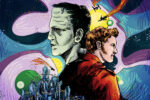In recent years, David Harbour has made quite a name for himself in Hollywood. You probably know him as Jim Hopper, the gruff and grumpy police officer in “Stranger Things.” The role earned him both a Critics’ Choice Award and Screen Actors Guild Award, making the brusque Hopper his most famous character yet. Although Harbour has reached critical acclaim playing Hawkins’ resident he-man, the actor recently expanded his portfolio by starring in the quirky mockumentary “Frankenstein’s Monster’s Monster, Frankenstein.”
The parody opens with Harbour, who is standing in front of a fake fireplace in an otherwise empty room. The remaining sets, he explains, “have all been scattered to the four winds.” After this dramatic declaration, Harbour begins to recount a faux-history for the audience.
Supposedly, Harbour comes from a long line of tortured actors, starting with his grandfather David Harbour Sr. In fact, Harbour’s father, David Harbour Jr., used the aforementioned fireplace in his last televised play. (If you’re already confused, don’t beat yourself up. The three men bear a striking resemblance to each other, and could even pass as the same person.)
David Harbour III, the one you know and love, then details a recent discovery he made while battling rats in his mother’s attic. Apparently, he stumbled upon lost footage from one of his father’s old televised theatricals. His curiosity piqued, Harbour began studying the footage to gain insight into his father’s character and career. Along the way, he questions his dad’s coworkers, friends and lovers, hoping to discover the truth about the complicated man.
Throughout the Orson Welles-esque mockumentary, Harbour mixes the theatrical footage with old interviews, commercials and acting classes. The play, however, steals the limelight — and the laughs. If you are a fan of old-timey playhouse featurettes and melodramatic soap operas, then “Frankenstein’s Monster’s Monster, Frankenstein” is the hybrid spoof of your dreams.
David Harbour Jr.’s fast-paced drama follows Dr. Frankenstein and his assistant, Sal, on their quest to secure funding from a prestigious research institution. Unfortunately, Frankenstein’s infamous monster is nowhere to be found, and his mysterious absence remains unexplained until the play’s conclusion. The institute sends Miss Macbeth, a scientist with an old Hollywood glam vibe, to inspect Dr. Frankenstein’s creation. But without the monster, Dr. Frankenstein decides to pose as the fiend and orders Sal to act as the new head scientist.
As you can imagine, the façade does not go exactly as planned. Along the way, however, the actors mercilessly poke fun at old-fashioned murder mysteries. Macbeth initially enters as the classic “mysterious woman,” complete with the dark outfit, black tresses and ruddy lipstick that define the iconic trope.
The camera then zooms in on an ornate handgun, lying on a velvet-covered coffee table. As Macbeth examines the weapon, a dark figure emerges from the woodwork and warns her not to touch the discarded gun. The narrator dubs this “the proverbial starting gun,” a detail that obviously hints at future violence.
Of course, the overzealous actors think the reference might have flown over audiences’ heads, and feel the need to point out the weapon’s significance. In a conversation with Sal, Macbeth declares, “You know what Chekhov said … if a gun is onstage in the first act, it needs to go off later in the play.” In the first five minutes of “Frankenstein’s Monster’s Monster, Frankenstein,” the actors are already breaking the fourth wall to point out their adherence to a well-known dramatic principle.
“Frankenstein’s Monster’s Monster, Frankenstein” provides even more laughably melodramatic musings on acting. Harbour Jr. (the beloved actor’s father, for those of you having trouble keeping up) constantly points out his career triumphs. After teaching an acting class, he jumps off the stage and declares, “That’s how I got into Julliard!”
After praising his own expertise, Harbour Jr. ends with a dramatic flourish, while enraptured fans clap noisily in the background. If you’ve ever attended an awkward improv class or watched a high-strung Shakespeare production, you’ll pick up similar vibes in this scene.
Additionally, the mockumentary acknowledges book nerds with several references to its namesake: the famous novel “Frankenstein,” which follows scientist Victor Frankenstein during his quest to create life. Oftentimes, readers call the resultant monster “Frankenstein,” rather than “Frankenstein’s monster,” to the chagrin of English teachers across the world.
Actors in “Frankenstein’s Monster’s Monster, Frankenstein” repeatedly take it upon themselves to fix this widespread mistake. Within minutes of her arrival, Macbeth asks to see the monster, to which Sal responds, “You want to meet Frankenstein.” As dramatic instrumental music ignites in the background, Macbeth corrects the young man, and continues to point out the mistake throughout the play. You’ll probably sympathize with Macbeth’s irritation if the blunder is one of your personal pet peeves.
https://www.instagram.com/p/Bz-3-yBnci-/
Despite its strengths, “Frankenstein’s Monster’s Monster, Frankenstein” suffers from a few minor flaws. If viewers are not well-versed in obscure theatre and literature references, the humor could go unnoticed, and the jokes are incredibly fast-paced, vanishing almost as quickly as they appear. With such a speedy tempo, some comedic elements get lost in the whirlwind.
All in all, the spoof is only around 30 minutes long, making it perfect for a busy schedule. However, the mockumentary could benefit from giving audiences an occasional breather or drawing out some of its highbrow jokes. With time, even viewers without a history in theatre or literature could grasp the more intellectual punchlines.
For Harbour, “Frankenstein’s Monster’s Monster, Frankenstein” is a hybrid of his typical nerdy vibes with an uncharacteristic subject matter. “Stranger Things” indulges geeks with the series’s constant nods to 1980s pop culture; in his mockumentary, however, the literature and theatre references stand out as unprecedented, based on the actor’s past work. If nothing else, Harbour’s fans can anticipate more as he continues to explore and experiment, and enjoy his newest erudite spoof.
















